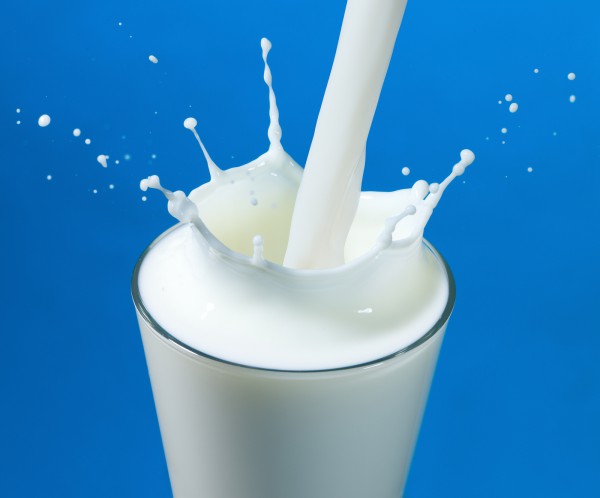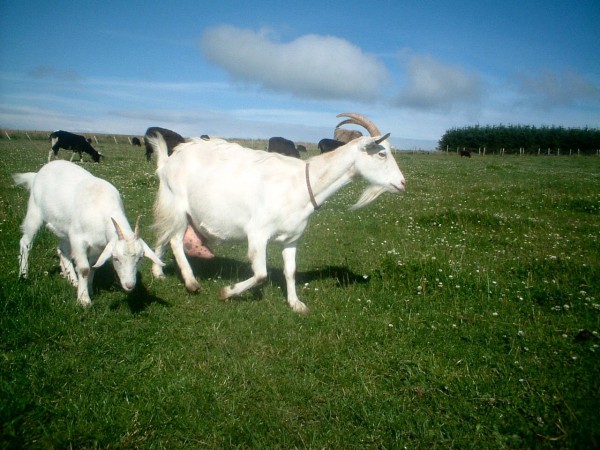Goat milk as a natural remedy
Goat’s milk is one of the healthiest foods especially when it comes to dairy products. Its chemical structure is incredibly similar to mother milk.
For ages across the globe goat’s milk is used not only for food but also as an aid in the treatment of many diseases such as bronchitis, combating allergies, for strengthening the immune system, treatment and strengthen the lungs …
Throughout the history of mankind goat milk is recommended for strengthening the immune system, treatment and strengthening lung tuberculosis . Goat milk can be a good ally in the fight against stress .
It contains vitamins B1 , B2 , B6 and B12, and therefore strengthens the nervous system. Because of all this , medicinal properties of goat’s milk should entice those people who really do not like the scent.
Goat’s milk has a distinctive taste and scent due to free fatty acids.
Benefits of goat milk
Goat’s milk is rich in calcium and phosphorus, which are important for bone strength, zinc and selenium, powerful antioxidants that maintain immunity of our body.

Spanish scientists recommend goat milk to people who suffer from anemia caused by lack of iron in the blood. Just goat milk, they say, encourage better utilization of iron in the body and the restoration of hemoglobin, the blood pigment who contains iron.
This milk is a rich source of biodegradable calcium, iron, phosphorus and magnesium and contains them in higher concentrations compared to cow’s milk.
Goat’s milk is extremely beneficial to consume, because it has very specific and effective therapeutic value:
- Against Bronchitis
- Eliminates Allergies
- Boosts the immune system
- Reduces the risk of lung cancer
- It is good for diabetics
Another specificity of goat’s milk is the presence of conjugated linoleic acid in milk fat. More and more studies showing the anti – carcinogenic effect of linoleic acid, which is why numerous studies have confirmed that goat’s milk is very important in the prevention of cancers .
Due to the fact that goats eat the bark of plants, their milk is rich in silicon which is a mineral that promotes the healthy skin, hair, nails and nervous system .
It contains a multitude of protein rich in essential amino acids , a wide array of vitamins and and doesen’t contain hard digestible fats. Not only is it easier for digestion like cow’s milk, but goat’s milk contains less lactose, so it may be easier for people sensitive to lactose.
Lactose
Goat’s milk contains a lower proportion of lactose compared to cow’s milk, which is an advantage for people who are lactose intolerant.
Some researchers have found that goat milk contains oligosaccharides who are acting anti-inflammatory and contribute for easier digestion, especially in the case of impaired intestinal function
Studies conducted in Sweden confirmed that the cow’s milk was the main cause of colic in 12-30 % of children aged up to third months, and nearly the same percentage at infants whose mothers drank cow’s milk.
At older children it was found intolerance to cow’s milk proteins in about 20 % of cases . Approximately 40 % of patients sensitive to cow’s milk protein are tolerating goat milk proteins.
Cow’s milk is not recommended in the diet of infants before one year of age. It is believed that children allergic to milk after the age of three can take goat without any consequences.
Because of that doctors in this period of life of children and also for adults, as replacement recommend consumption of goat milk.
This milk can be consumed by people who are allergic to cow’s milk. These people are sensitive to lactalbumin, which is specific to cow’s milk.
According to studies, only one of hundreds of children, who are allergic to cow’s milk, can’t tolerate goat’s milk. In folk medicine goat’s milk is recommended for persons with a sensitive stomach.
Vitamins and minerals
Milk contains all known vitamins. The fact that the lack of certain vitamins causes a range of diseases, says that proper nutrition of people (especially children and patients) can not be imagined without milk.
Although the content of mineral substances in goat’s and cow’s milk is quite similar, goat’s milk contains 13 % more calcium, 25 % more vitamin B6, 47 % more vitamin A, 134% more potassium, niacin three times and four times more copper.
For bone mineralization important role in that plays calcium and phosphorus. One glass of goat’s milk provides 32.6% of the daily value for calcium and 27 % for phosphorus, compared with 29.7 % cow’s milk (for calcium) and 23.2 % (for phosphorus).
For adults, goat milk can also help prevent high blood pressure and arteriosclerosis. Goat’s milk is a good source of potassium, an essential mineral for maintaining normal blood pressure and heart function.
A glass of goat’s milk contains 498.7 mg of potassium, and thus provides 14.2 % of the daily value. Goat’s milk also contains 27 % more selenium than cow’s milk.
Compared to cow’s , goat’s milk contains less folic acid important in the synthesis of hemoglobin.
In the end, not to forget that the whey, goat cheese and yoghurt are also a powerful natural resources, because of its medicinal properties which raise immunity in children.
It is important for the renovation and construction of bones, improve growth of the digestive tract, and are recommended for the prevention and treatment of liver diseases, osteoporosis, high cholesterol and blood pressure, inflammation, improves kidney function, and patron of many other diseases.
Source: secretly healthy



